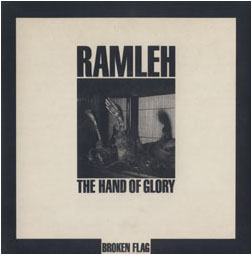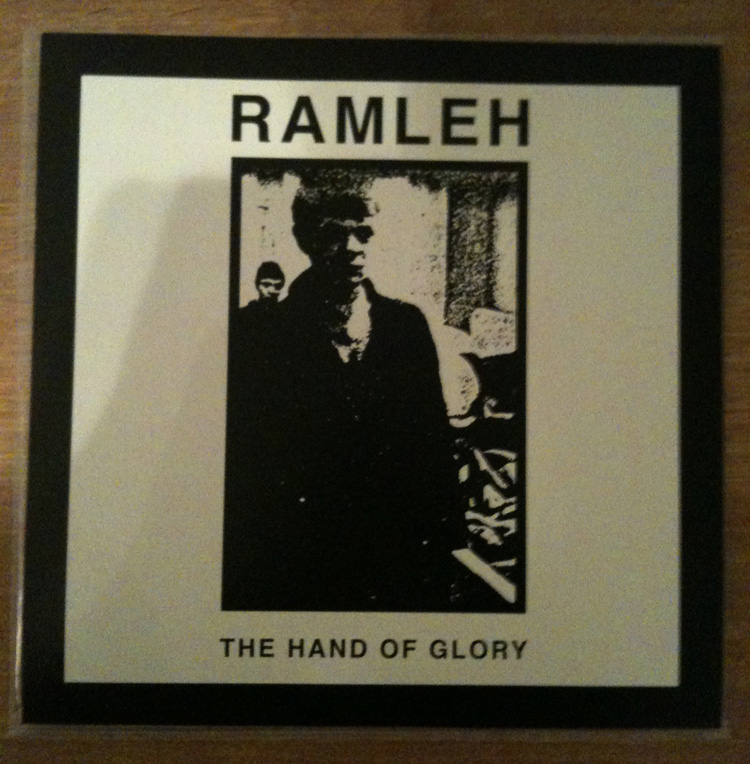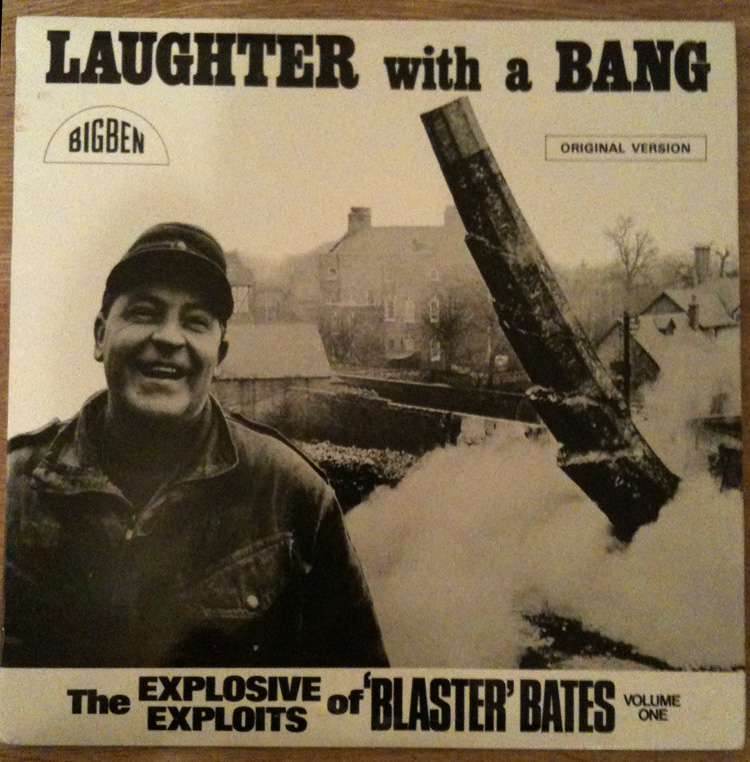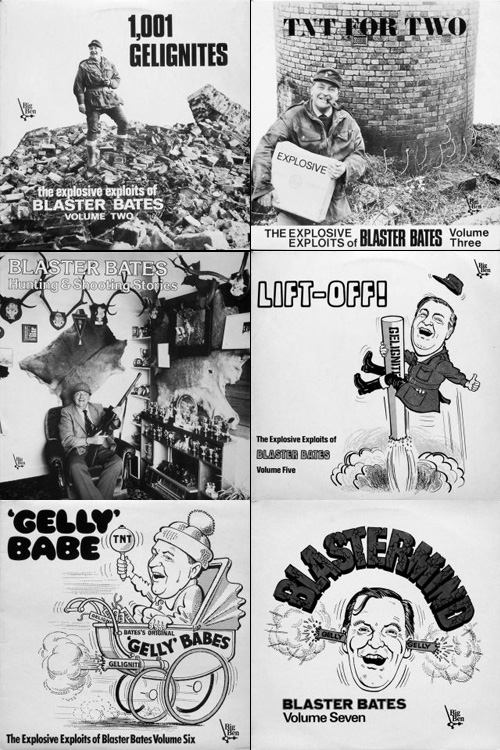Ramleh’s power electronics output of the 1980s completely passed me by at the time. I had some of their tracks on compilations I later binned or sold, but nothing really made an impression – until they reinvented themselves as sludge psych rockers in the mid 90s. But more of that some other time.
I guess there are a lot of reasons not to like early Ramleh. Certainly I don’t think I’m over-hyping the situation by saying that most people won’t like their work. That’s almost certainly part of the appeal. Simon Reynolds mounts an off the shelf moral case against the group, and power electronics in general, over at his “Rip It Up And Start Again Footnotes” blog.
Personally I’ve warmed to them over the years (and even to Whitehouse), as I think there is something in there which puts them in a different league to the generic atrocity-merchants who followed in their wake. There are elements which are sonically gripping and Gary Mundy (Ramleh’s only permanent member) has clarified his positions articulately and usefully over the years, whilst still maintaining the crucial mystique of the work:
“There was no right-wing viewpoint to any of the stuff – we made an error in judgment in testing out the bounds of offensiveness.” (interview in Grim Humour)
“The lyrics I write tend to come from a more miserable, sad place, I think. It’s not particularly violent. Although it’s noisy, it’s not a real in-your-face attacking kind of thing. […] Someone once said – and I hadn’t really thought about it before – that our music is more from the viewpoint of the victim, rather than the aggressor.” (interview in Niche Homo)
“My personal outlook at the time was a kind of weird amalgam of anarchism, libertarianism and a warped kind of socialism. I sympathised with some of what was being done at the time but it was all so negative and humourless, and a lot of people involved with these left-wing organisations were such wankers, it was difficult to to want to associate with them.” (interview in As Loud As Possible)
Mundy’s Broken Flag label has been seriously reappraised in recent years, with a ludicrously lavish boxset coming out on Vinyl On Demand, a nice piece by David Keenan in The Wire and various releases finally making the journey from cassette to vinyl or CD. “Awake”, a further eight CD set of Ramleh’s 80’s output is forthcoming on Harbinger Sound.
Martin of Beyond The Implode has already covered some of the collector mania in his piece about Ramleh’s “Hand of Glory” single, which has been referred to as one of the ultimate records of the genre. All of which piqued my interest when it was repressed for the second time as a twelve inch last year:
“The Hand of Glory” is the pickled hand of a man who has been hanged. Particularly a hand that has committed murder. It’s said to have magickal properties – enabling one to open any locked door, or rendering other people motionless. Gary Mundy credits this aspect of Ramleh to his co-conspirator Jerome Clegg:
“Jerome was getting very into reading about medieval torture and satanic rituals at this time. I was getting more interested in concepts of morality and freedom. My influence came through more in our next phase but Hand of Glory is more Jerome’s subject-wise. Musically it was very much a joint effort. The vocals are less like the previous Ramleh records, they sound more desperate than angry. It’s a curious record. It’s very uncomfortable listening without completely trying to blast you out of your chair. It was the last recording of ours that I would call ‘power electronics’.”
The first thing to say is full marks to Harbinger. I ordered direct from the label and found them friendly and prompt. The presentation is stark, but well done. A satisfyingly thick slab of vinyl with black labels. My copy is hand numbered 53 out of 100 copies. It’s all nicely fetishistic, which I think is what people who dig this stuff are looking for.
“Squassation” starts with some static noise, followed swiftly by a droney bass rumble. Other noises, echo and some indistinct screams are added to the mix. It’s a brutal soundscape which stays pretty constant, no pummeling rhythms or anything like that. At the heart of nothing very much happening is the worry that something not very pleasant might be about to happen.
“Prossneck” has some darkside seventies sci-fi synths and a male voice reading an account of unpleasant things being done to someone. It’s pretty good to get fucked up to, but I worry about it inducing masochistic tendencies – I always feel pretty great when side one has finished.
Side two features two parts of “The Hand of Glory”. I never notice when one ends and the other begins, personally. It builds on the noises of side one, but adds a cacophony of tortured voices, including one repeatedly shouting “No!’. It’s been said before by people more versed in this stuff than me, but there’s a properly horrid psychedelic edge to a lot of this – real bad trip stuff. After a few minutes even the screams become somehow normalised, everything melds together into this occasionally jagged, occasionally dulling experience that you can drift in and out of. I really like it, but I’d be hard pressed to describe why to anyone else. I guess its akin to a banishing ritual in some ways – a catharsis which sucks in all the shit you have had to subject yourself to – and spits it out… if not back at the aggressors, then somewhere else.
It’s no coincidence that my interest in this sort of thing has re-emerged during a time which has been slightly darker and depressive. Or maybe it’s just the onset of my mid life crisis…
I don’t need shelves and shelves of this stuff in my life, but I’m very glad I own a copy of The Hand of Glory.
Unfortunately for power electronics collector nerds, Ramleh’s masterwork appeared in my life at the same time as this:
As you can see from the cover, this is the Original Version – none of your repackage reissue business. The sleeve is in stark black and white, resembling that classic Broken Flag starkness. Also it’s in MONO – the true hallmark of extreme audio product. Oh and Blaster looks eerily like TG-era Genesis P-Orridge on the cover:
Stylistically the phallic nature of the falling chimney resembles the notorious artwork for Whitehouse’s “Erector” album. Deconstructing the cover means we are able to read its meaning as “an enormous wilting penis, falling on Genesis P-Orridge’s head”.
But where Genesis was content to pursue his art through extreme performance, Blaster eclipsed the entire industrial and power electronics scenes through both his performances and day job. “Laughter With A Bang” is a recording of a Live Action that took place at a meeting of the Congleton Round Table in May 1967 – nine years before Throbbing Gristle’s debut at the ICA, and fifteen before Ramleh was launched.
It commences with Bates prowling the stage and slowly building up the intensity of the event by baiting female members of the audience. He then whips out some GELIGNITE and talks about using it to blow up your mother in law. Peter Sotos never had chops like this!
Later on there’s a section where a small amount of the gelignite is added to a bowl of water and bubbles away like some of the sound effects on Whitehouse’s “Dedicated to Peter Kurten” LP. On one level, Blaster Bates was simply a slightly “blue” after dinner speaker telling stories about his work as an explosives expert. But to my mind he was also a precursor to the whole industrial music movement.
The Shower of Shit Over Cheshire is the highpoint of the album, combining expectation, black humour and the beauty of release and destruction at its end. If power electronics acts had soundclashes, and someone played Whitehouse’s “Shitfun” after this, they’d be laughed out of the room.
“Laughter With A Bang” went gold at the time of its release and was followed by seven further albums, all as starkly packaged as anything the Come Organisation would sling out in the eighties:
Obviously you might think this is all just a coincidence, that there is no real connection between Blaster Bates and industrial music. I would point sceptics towards Throbbing Gristle’s classic 2nd LP “D.O.A.” and the track “Valley of the Shadow of Death”. This is a solo piece by the late Peter Christopherson, featuring covertly recorded conversations. One of these conversations includes an account of an entire row of houses being demolished and discussions of the merits of the explosive properties of white phosphorous. Whilst this is all delivered in a brummie drawl rather than Blaster’s Cheshire burr, the parallels are clear.
Blaster stopped demolition work in 2001 after a stroke, AT THE AGE OF 79. He was blowing things up until he was nearly eighty! He carried on his Live Actions after that, eventually passing away after heart failure in 2006.
It is doubtful that Vinyl On Demand will be producing a lavish retrospective boxset of his work. The twats.





Pingback: TWEETS THAT MENTION UNCARVED.ORG BLOG » BLOG ARCHIVE » RAMLEH MEETS BLASTER BATES AT UPTOWN CONGLETON -- TOPSY.COM
Excellent post, John… exactly what blogs are still for/what they’re best at… There’s a Hand Of Glory in The Wicker Man, of course and it’s a big part of the mid-series slice of The Invisibles… a lovely little meme, I think…
And of course, Ramleh spelt backwards gives you forklift and construction equipment manufacturer Helmar…http://www.helmarparts.com/
“blaster” al ackerman?
Well this is all great! Of course “Blaster” Al Ackerman was the mail art guy and general nutter who inspired TG’s “Hamburger Lady” which is also on the DOA LP, so it’s all fitting together, er sort of.
I hadn’t picked up on the Wicker Man stuff either (or the forklift truck manufacturer!).
“If power electronics acts had soundclashes, and someone played Whitehouse’s “Shitfun” after this, they’d be laughed out of the room.”
Just sprayed a mouthful of tea all over my computer! Cheers for that 🙂
Hmm…and tell me the story linked to couldn’t have appeared on the cover of ‘Scatology’…
I used to go out with a girl whose father was a close friend of Blaster Bates (I know this because I too have that LP and she came across it at some point).
Unfortunately i never got to meet Mr Bates.
Although this is hard to believe, I was not going out with her because of this familial connection.
Wow that’s real “six degrees of separation” stuff, Matt!
superb work